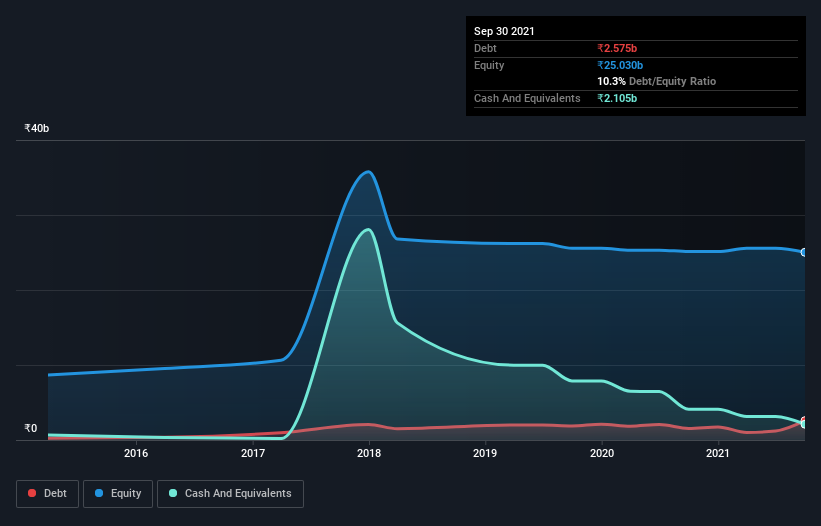Unichem Laboratories (NSE:UNICHEMLAB) Is Making Moderate Use Of Debt
Howard Marks put it nicely when he said that, rather than worrying about share price volatility, 'The possibility of permanent loss is the risk I worry about... and every practical investor I know worries about.' So it might be obvious that you need to consider debt, when you think about how risky any given stock is, because too much debt can sink a company. Importantly, Unichem Laboratories Limited (NSE:UNICHEMLAB) does carry debt. But is this debt a concern to shareholders?
When Is Debt Dangerous?
Debt is a tool to help businesses grow, but if a business is incapable of paying off its lenders, then it exists at their mercy. Part and parcel of capitalism is the process of 'creative destruction' where failed businesses are mercilessly liquidated by their bankers. While that is not too common, we often do see indebted companies permanently diluting shareholders because lenders force them to raise capital at a distressed price. Of course, debt can be an important tool in businesses, particularly capital heavy businesses. When we think about a company's use of debt, we first look at cash and debt together.
See our latest analysis for Unichem Laboratories
What Is Unichem Laboratories's Net Debt?
As you can see below, at the end of September 2021, Unichem Laboratories had ₹2.58b of debt, up from ₹1.54b a year ago. Click the image for more detail. However, because it has a cash reserve of ₹2.10b, its net debt is less, at about ₹470.4m.

How Healthy Is Unichem Laboratories' Balance Sheet?
The latest balance sheet data shows that Unichem Laboratories had liabilities of ₹5.29b due within a year, and liabilities of ₹1.04b falling due after that. Offsetting this, it had ₹2.10b in cash and ₹3.65b in receivables that were due within 12 months. So its liabilities outweigh the sum of its cash and (near-term) receivables by ₹577.2m.
Of course, Unichem Laboratories has a market capitalization of ₹16.7b, so these liabilities are probably manageable. But there are sufficient liabilities that we would certainly recommend shareholders continue to monitor the balance sheet, going forward. When analysing debt levels, the balance sheet is the obvious place to start. But it is Unichem Laboratories's earnings that will influence how the balance sheet holds up in the future. So if you're keen to discover more about its earnings, it might be worth checking out this graph of its long term earnings trend.
Over 12 months, Unichem Laboratories made a loss at the EBIT level, and saw its revenue drop to ₹12b, which is a fall of 9.0%. That's not what we would hope to see.
Caveat Emptor
Over the last twelve months Unichem Laboratories produced an earnings before interest and tax (EBIT) loss. To be specific the EBIT loss came in at ₹326m. Considering that alongside the liabilities mentioned above does not give us much confidence that company should be using so much debt. So we think its balance sheet is a little strained, though not beyond repair. Another cause for caution is that is bled ₹2.9b in negative free cash flow over the last twelve months. So suffice it to say we consider the stock very risky. There's no doubt that we learn most about debt from the balance sheet. But ultimately, every company can contain risks that exist outside of the balance sheet. Be aware that Unichem Laboratories is showing 2 warning signs in our investment analysis , and 1 of those doesn't sit too well with us...
Of course, if you're the type of investor who prefers buying stocks without the burden of debt, then don't hesitate to discover our exclusive list of net cash growth stocks, today.
New: AI Stock Screener & Alerts
Our new AI Stock Screener scans the market every day to uncover opportunities.
• Dividend Powerhouses (3%+ Yield)
• Undervalued Small Caps with Insider Buying
• High growth Tech and AI Companies
Or build your own from over 50 metrics.
This article by Simply Wall St is general in nature. We provide commentary based on historical data and analyst forecasts only using an unbiased methodology and our articles are not intended to be financial advice. It does not constitute a recommendation to buy or sell any stock, and does not take account of your objectives, or your financial situation. We aim to bring you long-term focused analysis driven by fundamental data. Note that our analysis may not factor in the latest price-sensitive company announcements or qualitative material. Simply Wall St has no position in any stocks mentioned.
Have feedback on this article? Concerned about the content? Get in touch with us directly. Alternatively, email editorial-team (at) simplywallst.com.
About NSEI:UNICHEMLAB
Unichem Laboratories
A pharmaceutical company, manufactures and sells pharmaceutical products in India, the United States, and internationally.
Adequate balance sheet with questionable track record.
Similar Companies
Market Insights
Community Narratives



